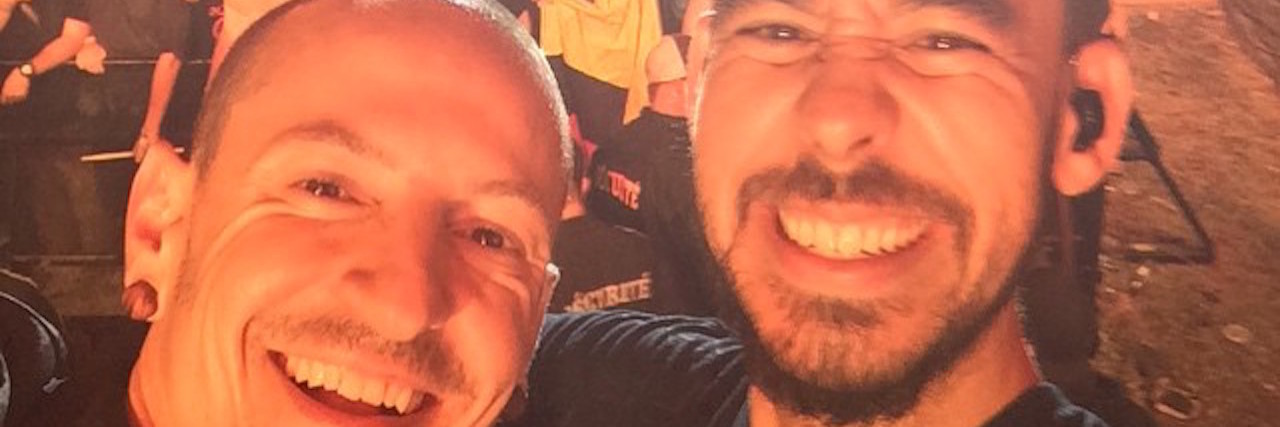Linkin Park's Mike Shinoda Releases 'Post Traumatic' EP After Chester Bennington's Death
Editor’s note: If you experience suicidal thoughts or have lost someone to suicide, the following post could be potentially triggering. You can contact the Crisis Text Line by texting “START” to 741-741.
If you’re still grieving Chester Bennington’s death, you’re not alone.
On Thursday, Linkin Park frontman Mike Shinoda released an EP entitled “Post Traumatic” featuring three new songs about his grieving process after Bennington’s death in July. The songs explore the complexity of grief, delving into an emotion we don’t often talk about after suicide loss — anger.
On Instagram and Twitter, Shinoda announced the release of his EP with a message to his fans.
The past six months have been a rollercoaster. Amidst the chaos, I’ve started to feel an intense gratitude — for your tributes and messages of support, for the career you have allowed me to have, and for the simple opportunity to create.
Today, I’m sharing three songs I wrote and produced, with visuals that I filmed, painted, and edited myself. At its core, grief is a personal, intimate experience. As such, this is not Linkin Park, nor is it Fort Minor — it’s just me.
Art has always been the place I go when I need to sort through the complexity and confusion of the road ahead. I don’t know where this path goes, but I’m grateful I get to share it with you.
https://t.co/H25dDJZsaJ pic.twitter.com/VnPEhD3E0q
— Mike Shinoda (@mikeshinoda) January 25, 2018
Since Bennington’s death, Shinoda has been open with fans about what his grieving process looks like.
“Grief is a non-linear process. It doesn’t have ‘stages’ that go in order, it has phases that come and go at random,” he told Billboard. “Some people are having sad days, others are having good days, others are having angry days.”
On the “Post Traumatic” EP, Shinoda gives us a glimpse into what grief on his “angry days” might look like. The EP is comprised of three songs, entitled “Place to Start,” “Over Again” and “Watch As I Fall,” (You can watch them below).
In particular, “Over Again” hones in on what anger can look like in the grieving process of a suicide loss survivor. In the lyrics, the song addresses both the “unanswerable” questions suicide loss survivors are often asked and the frustration those questions can often bring.
And everybody that I talk to is like, “wow
Must be really hard to figure out what to do now”
Well thank you genius, you think it’ll be a challenge
Only my life’s work hanging in the fucking balance
And all I wanted was to get a little bit of closure
And every step I took I looked and wasn’t any closer
‘Cause sometimes when you say goodbye, yeah you say it
Over and over and over and over
While we typically associate grief with sadness, it’s very common to feel anger after someone dies by suicide. Suicide loss is deeply painful and can leave us with complicated questions and feelings that may come out as anger. This is something Mighty contributor Ash Thomas is familiar with. In their piece, “Dealing With the Anger I Felt After My Friends’ Suicides,” they wrote about feeling anger after losing four friends to suicide in the span of one year.
When I found out each one had died, I was so angry. Not at them — that wasn’t something they deserved. I was angry the mental health system had failed them. I was angry they felt they had no other options. To some extent, I was angry at myself for not noticing they were in such pain. Feeling anger was hard and I didn’t know how to deal with it…
At some point, the anger transformed. [My] letters stopped reading as angry and started reading as sadness. The screaming turned into sobbing. Hitting something didn’t feel right. I realized, underneath the anger, I was profoundly sad. People I loved were gone and my heart hurt so badly. People I loved were gone and I was sad about it. Processing through the sadness was easier than processing through the anger. It felt calmer, more understandable. I wouldn’t have gotten there without feeling angry and letting myself feel angry. When I felt angry, I felt guilty for feeling angry, but I let myself feel it anyways. The sadness felt painful, but I let myself feel it anyways.
“I wanted to put this out as soon as possible because I’m living it, and a lot of other people are living it, too,” Shinoda said on Twitter where he answered fan questions about “Post Traumatic.”
(2/2) And I wanted to put this out as soon as possible because I’m living it, and a lot of other people are living it, too. I want people to see and hear it as soon as I complete each thing. #PostTraumatic
— Mike Shinoda (@mikeshinoda) January 25, 2018
Thank you, Mike Shinoda, for bravely putting your emotions on display and giving hope to so many people who are still struggling with the loss of Chester Bennington. We wish you and the Linkin Park family all the best.
If you are struggling with the loss of a loved one to suicide, please know you are not alone. There are resources for suicide loss survivors. If you are struggling and need help right now, call the National Suicide Prevention Lifeline at 1-800-273-8255.
If you or someone you know needs help, visit our suicide prevention resources page.
If you need support right now, call the National Suicide Prevention Lifeline at 1-800-273-8255 or text “START” to 741-741.
Screenshot via Mike Shinoda YouTube channel

